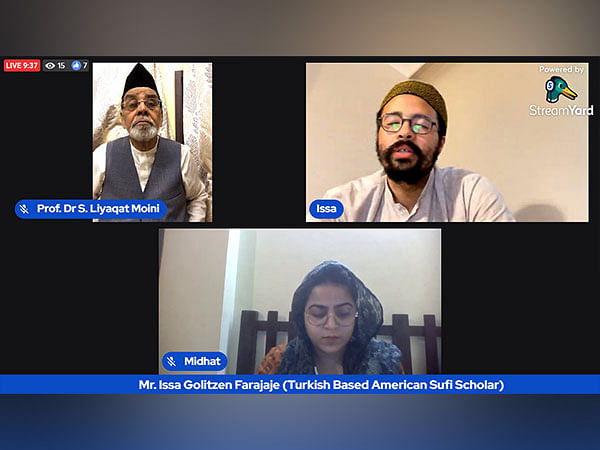New Delhi [India], June 7: Indo Islamic Heritage Center (IIHC) director and Gaddi Nasheen of Dargah Khwaja Saheb Ajmer Sharif, Professor Syed Liaqat Hussain Moini, has said Indian and Anatolian Sufism share several connections due to the historical and cultural exchanges that took place between the Indian subcontinent and Anatolia (modern-day Turkey) over the centuries.
The remarks by Moini came at an IIHC-organised webinar on “Connection Between Indian and Anatolian Sufism”.
Sufism, Islamic mysticism or asceticism which was propagated from different regions, including India and Anatolia, developed unique characteristics in each context.
Main Speaker of the Webinar Issa Golitzen Farajaje, a Turkish-based US Sufi scholar, said while Indian and Anatolian Sufism have distinct regional flavours and practices, they are interconnected through shared spiritual lineages, cultural exchange, and the influence of prominent figures like Rumi and the Chishti saints.
These connections have contributed to the diversity and richness of Sufi traditions in both regions, he noted.
The most significant link between Indian and Anatolian Sufism is through the influence of the renowned Persian Sufi poet and mystic, Mevlana Jalaluddin Rumi.
Rumi’s teachings and poetry, compiled in his work ‘Masnawi’, have had a profound impact on Sufism in both regions.
His writings on love, devotion, and union with the divine resonate with Sufis in India and Anatolia alike.
He added that similarly the Chishti Order, one of the prominent Sufi orders in India, traces its spiritual lineage back to Khwaja Moinuddin Chishti, a Sufi saint from the Chisht region in present-day Afghanistan.
Khwaja Moinuddin Chishti’s teachings and practices had a significant influence on Sufism in Anatolia, particularly through his disciple, Khwaja Qutbuddin Bakhtiar Kaki, who migrated to Delhi and spread the Chishti order there.
The Chishti order became popular in India and later influenced Sufi traditions in Anatolia. (ANI)
This report is auto-generated from ANI news service. ThePrint holds no responsibility for its content.






